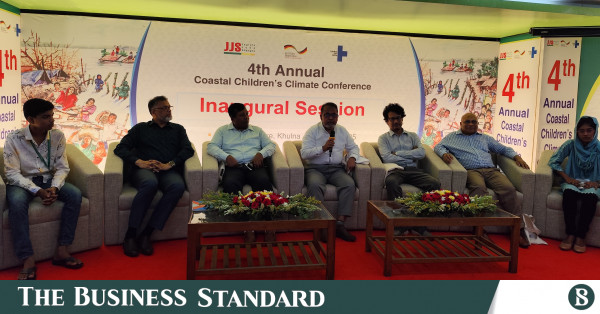17 lakh people have been displaced so far due to climate-related impacts
Speakers at the Fourth Annual Climate Child Conference in Khulna. Photo: TBS
“>

Speakers at the Fourth Annual Climate Child Conference in Khulna. Photo: TBS
The escalating impacts of climate change have placed around 3.5 crore children in Bangladesh at direct or indirect risk, a senior Unicef official has said, underscoring how increasing disasters, displacement, and environmental degradation are endangering the country’s youngest generation.
Speaking at the Fourth Annual Climate Child Conference in Khulna, Kawsar Hossain, head of Unicef’s Khulna Field Office, warned that unless children’s needs are prioritised in national planning and budgeting, “the future of the planet will remain unprotected”.
The two-day conference, organised by Jagrata Juba Shangha in collaboration with the Coastal Children’s Forum on Climate Change, held at the CSS Ava Centre in Khulna and concluded today (28 April), brought together around 200 children from coastal regions, among the communities most vulnerable to climate shocks.
In the keynote address, Prof Dr Zakir Hossain of Khulna University’s Urban and Rural Planning Discipline said an estimated 10,000 people are displaced each year in Bangladesh because of climate-related events, with around 17 lakh displaced to date – most migrating from coastal areas to urban centres.
He explained that frequent natural disasters force families into debt, often leading them to abandon their homes for the cities in search of livelihoods. “Rising salinity has made agriculture nearly impossible in many coastal regions, while employment in aquaculture is dominated by powerful groups, limiting opportunities for ordinary families,” he said.
Prof Zakir added that once displaced, families face high costs of living in urban slums and informal settlements, where safe water and sanitation are severely lacking. “While adults suffer, children bear the greatest burden of these harsh conditions,” he noted.
At the closing session, participating children presented a list of 21 demands, calling on policymakers to take urgent action to address the damage caused by climate change.
Khulna University Vice-Chancellor Prof Md Rezaul Karim, who attended as chief guest, said women and children account for 80% of casualties during natural disasters. He emphasised the need for better public awareness and planning to minimise the impact of future events.
“If adults make mistakes, children can show the way, as they did during the mass uprising of July 2024,” he said, describing children as a “powerful natural force”.
Faruk Wasif, director general of the Press Institute of Bangladesh, speaking as a special guest, called for a broader vision of intergenerational justice. “We must leave behind not just wealth, but oxygen, rivers, and greenery for future generations,” he said.
He pointed out that although children represent a significant share of Bangladesh’s population, they are often excluded from climate policy discussions despite being among the most vulnerable.
ATM Zakir Hossain, executive director of Jagrata Juba Shangha, welcomed participants by highlighting the disproportionate impacts of climate change on coastal children – including threats to their homes, education, food security, health, and safety.
The event, aimed at highlighting the growing risks climate change poses to children, was supported by the German Federal Ministry for Economic Cooperation and Development and Kindernothilfe.
Since 2021, Jagrata Juba Shangha has organised annual climate conferences for children in coastal areas. Based on the insights gathered, a coastal children’s forum has been established, bringing together around 5,000 children committed to building resilience and tackling climate change challenges.


